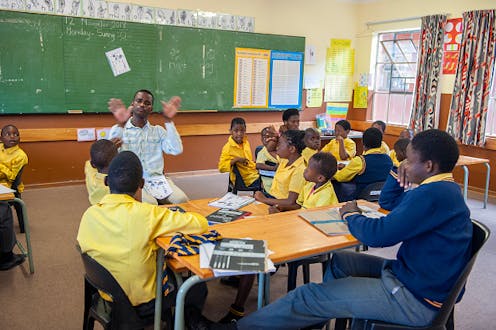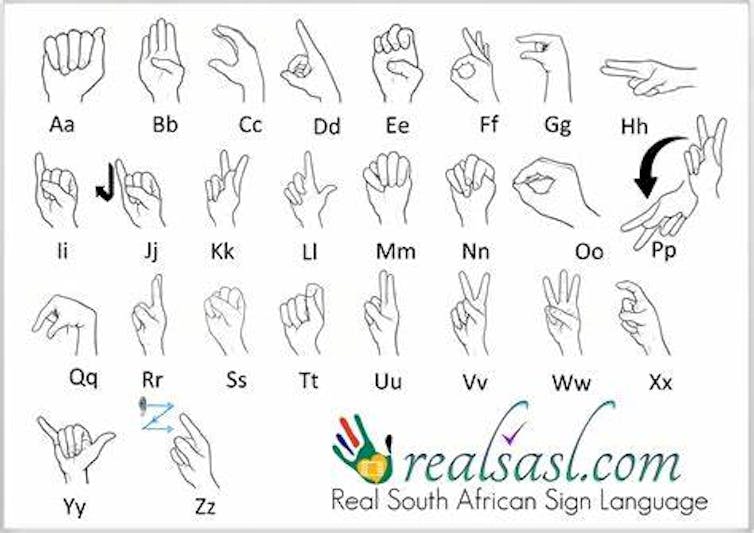
Sign language is on its way to become the 12th official language in South Africa after parliament recently agreed to amend the constitution to this end. The move will bring to fruition three decades of a struggle to empower the country’s deaf community. An official language has legal status in a state and serves as the language of administration (conducting day-to-day state business). We asked Theo du Plessis, an emeritus professor of South African Sign Language and Deaf Studies, for his insights.
What was the process leading to sign language becoming an official language?
Numerous attempts have been made since the adoption of the interim post-apartheid constitution in 1993 – in which South African Sign Language was not mentioned at all – to make it official.
These included a formal request by the South African National Deaf Association (DeafSA) to the Pan South African Language Board (PanSALB) in 1996. The board is constitutionally mandated to develop and promote the country’s current 11 official languages, and the non-bantu indigenous click languages – incorrectly referred to as “Khoisan” languages.
The board can’t give languages official status, so nothing came of the request. Eventually another submission was made to the Constitutional Review Committee in February 2007. Two further submissions in 2013 and 2015 were made to parliament to recommend that South African Sign Language be made official.
In February 2020, the president announced the pending official recognition of sign language as the country’s 12th official language.
Two years earlier, the United Nations had expressed concern about the slow pace of amending the constitution to recognise South African Sign Language.
Only on 25 May 2022 did cabinet approve the Constitutional Eighteenth Amendment Bill for public comment.
After public hearings in March 2023, the committee recommended the bill for approval. The National Assembly gave its approval to make South African Sign Language official on 2 May 2023. The National Council of Provinces has also approved and the president must sign the amendment as law.
In what ways will this benefit users of sign language?
To be honest, not in any meaningful way. The constitution obligates the government to use at least two official languages for the purposes of government administration. The Use of Official Languages Act, 2012 later made this at least three languages. So, there is no legal requirement that all 11 languages must be used. The official languages therefore have only symbolic value at most.

For all practical purposes, the current language regime is in fact dysfunctional. The state primarily uses only one language, English.
One consolation is that the Use of Official Languages Act requires state entities to accommodate people who choose South African Sign Language as their preferred language when communicating with the state.
Hearing people do not enjoy the same official language right to use their preferred language when communicating with the state.
What constitutional rights do sign language users currently enjoy?
First language users of South African Sign Language already enjoy all the same individual language rights that hearing South Africans enjoy – in fact even more – without sign language being an official language. So, making their language official is not giving them access to any new right.
Deaf people and persons with serious hearing loss already have the individual language rights that are guaranteed for all citizens – such as the right to access to information, to cultural association, to non-discrimination on the basis of language and to interpretation in courts.
A provision of the South African Schools Act declares South African Sign Language official in public schools for the purposes of education.
How did the country decide which sign language to use?
There’s a lot of lexical variation in South African Sign Language. One of the earliest publications on the subject, from 1998, poses a similar question: South African Sign Language - one language or many?
The authors, Debra Aaron and Philemon Akach, argue that the variation found in sign language is at most geographical and that these “dialects” all contain the same grammatical structure.
It signifies the existence of one national sign language. The Schools Act partly answers the question. It stipulates that the sign language to be used for education purposes will be the one approved by PanSALB. Usually, the language variety used in education is considered the standard variety of the official language.
The board is also working towards the further standardisation of the sign language. In collaboration with DeafSA, the first comprehensive electronic dictionary for South African Sign Language was made available last year.
The board has also set up a working group to further the standardisation initiative. The idea is not to create “one” sign language; rather to cultivate one standard for using South African Sign Language in higher functions – such as in parliament, government administration, universities and the courts.
In conclusion, making South African Sign Language official is more symbolic than useful.
The justice minister, in his motivation for making South African Sign Language official, echoes the claim made by DeafSA way back in 2007. It is that for the deaf (and hard of hearing persons) an official sign language will help this community to realise and enjoy their rights and human dignity, make them an integral part of South Africa and promote inclusivity.
However, the same people who have failed to realise existing rights will be responsible for trying to do so now, in the context of a largely dysfunctional and even more complex official language dispensation. I don’t envisage any significant changes in the lives of a very marginalised community who are being misled into expecting a better life for all.
Theo du Plessis receives funding from National Research Foundation
This article was originally published on The Conversation. Read the original article.







